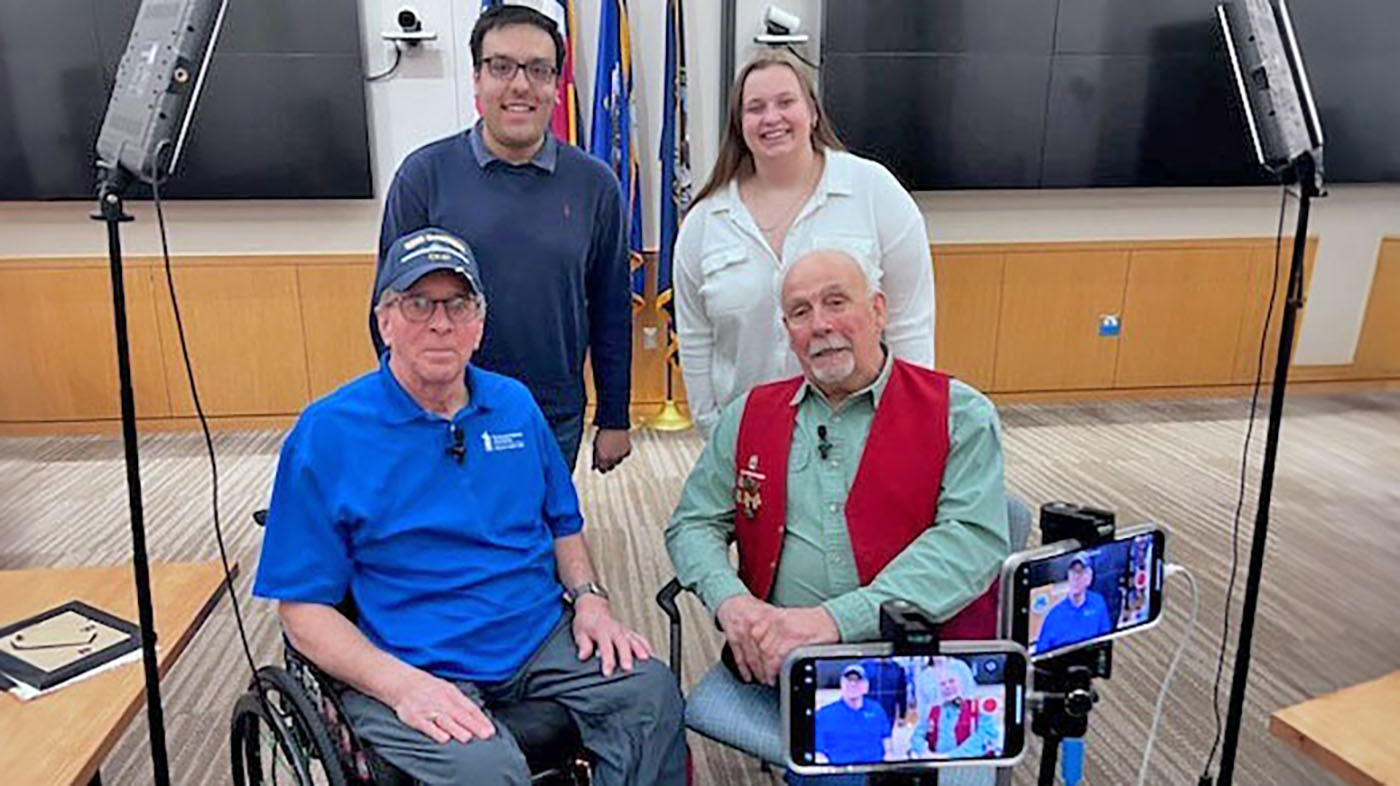Every Veteran has a unique story and memories. Each day, Veterans from all military experiences pass away, leaving their rich history untold. The simple act of asking to hear a Veteran’s story can make it possible to carry their stories on for future generations.
Anit Tyagi, research assistant at Rocky Mountain Regional VA, felt compelled by his passion for military history to preserve Veterans’ stories.
He had no video experience, yet he started recording stories through interviews in 2022 with his project Remembering Our Veterans. VA’s Center for Development and Civic Engagement supports this video memoir program, which uses VA volunteers to interview Veterans.
“It’s an amazing way to get firsthand accounts from Veterans and preserve American history. Veterans’ histories not only for Veterans and their loved ones, but also for academic, historical, public engagement and VA memorialization purposes. Remembering Our Veterans was started to fill this gap,” Tyagi shared.
Pictured above are Tyagi (top left), volunteer video producer Grayson Fast (top right), Veteran Jeff Richcreek (bottom left) and volunteer interviewer David Pyle.
Years in the making
Tyagi started volunteering at VA in 2015 during his sophomore year in high school. He continues to volunteer in palliative and hospice care where he appreciates spending hours talking with Veterans.
“I sat with a World War II Veteran for several hours in palliative care. I realized he may not have children or any living family. When he passed away, his stories would die with him. That was the catalyst for me to catalog these memoirs,” he said.
Many older Americans can be considered kinless, without partners, spouses, children or siblings.
The videos are recorded using two iPhones, four tripods, wireless microphones, lighting and battery packs. This equipment fits in a medium-sized tote bag, making the kit mobile, which allows the video team to easily go to patient rooms and VA nursing homes to conduct interviews.
Veterans can review footage of their interview and they have full control over the content of their video. Remembering Our Veterans has teams at Rocky Mountain Regional VA and PFC James Dunn VA Clinic in Pueblo. Tyagi hopes to expand the program nationwide.
Value beyond a video
Family members often keep voicemails from a deceased loved one so they won’t forget the sound of that person’s voice.
“By making these videos, we’re capturing a ‘living snapshot’ of each Veteran, preserving their voice, mannerisms and personality. We’re able to connect people who’ll be born decades later with their ancestors,” Tyagi said.
Army Veteran and VA volunteer David Pyle is a frequent interviewer.
“I’ve met several extraordinary individuals. Veterans talk about a variety of experiences and the profound effect the military has had on their lives. I think the project has significant value regarding creating a legacy,” Pyle said.
Navy Veteran Jeff Richcreek, 68, completed his memoir video in March. “Everybody has a story to tell and Veteran stories are different from others because of all we’ve had to go through. During the interview, I felt very relaxed. It was good to talk about things I haven’t talked about in a while,” Richcreek said.
Progress in one year
Sixty-one videos have been completed in the first year of Remembering Our Veterans. “We’re constantly improving our process to make it more user-friendly and to produce higher-quality interviews,” said Tyagi.
Remembering Our Veteran videos appear on VA’s YouTube channel and Tyagi submits interviews to the Library of Congress to be digitized and archived for online viewing.
Topics in this story
Link Disclaimer
This page includes links to other websites outside our control and jurisdiction. VA is not responsible for the privacy practices or the content of non-VA Web sites. We encourage you to review the privacy policy or terms and conditions of those sites to fully understand what information is collected and how it is used.
More Stories
Pacific Islands VA has opened a new urgent care clinic inside the Daniel K. Akaka VA Clinic.
From one battle to the next, including four types of cancers, Eliot Winokur’s resilience remains unshaken.
As severe weather threatened Mississippi, local news warned of a dangerous outbreak of tornadoes. A VA nurse stepped up.






When the US returned Okinawa to Japan in 1972, I was one of the people that stayed behind to help clen-up and indoctrinate the Japanese Air members to the Yoza Dake Radar Station Okinawa.
While cleaning out some of the offices I found a 7″ audio tape. When I asked the Captain in charge what I should do with it, he said I could keep it or trash it. Since I owned a reel-to-reel player I chose to keep it.
Brief Summary of what is on the tape:
One side is an actual air to ground communication of a Jolly Green Giant’s mission to rescue a downed airman in Viet Nam.
The other side was taped in various Officer Clubs in Viet Nam and Thailand. It is full of songs that are sung to familiar tunes of the time. The performers have improvised adding their own words to the tunes. One song tells the story of Maj Fisher’s rescue of Col. Myers in Au Shau Valley, Maj. Fisher was awarded the Congressional Medal of Honor for his part. If you are interested please contact me and we can discuss this further. Some of the songs, and 2 interviews, are bawdy, graphic, but that was how they entertained themselves.
I wrote a book about my experience in Vietnam under the pen name of David Lee. If VA would like a copy I can send one. All I would need is an address to send it to.
Great idea and way to preserve veterans’ memorable military experiences!